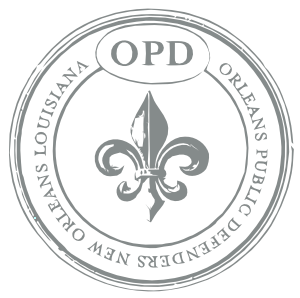Ten New Orleans Organizations To Share $1.5 Million In Federal Crime-fighting Money
Nola.com - December 13, 2010
New Orleans - Ten local public and private organizations will share a $1.5 million federal grant that will underwrite activities designed to prevent and fight crime.
As Council Passes Budget, Some Worry About Higher Taxes
WWLTV.com - December 1, 2010
New orleans – As the New Orleans City Council passed the 2011 budget Wednesday, word spread quickly about spikes in fees and property taxes.
Carrie Ellis and Daniel Engelberg Take on New Roles
OPD is excited to announce two staff promotions – Carrie Ellis has been named Training Director and Daniel Engelberg named Deputy Chief of Trials.
As Training Director, Carrie will continue the development and implementation of OPD’s extensive training programs for new and established attorneys that support our mission and vision, meet client needs, and keep attorneys current on the latest changes and most important aspects of criminal law.
Daniel Engelberg takes on the newly created role of Deputy Chief of Trials. Working closely with Chief of Trials Kendall Green, Daniel will help identify and address specific case challenges with staff attorneys, investigators, client services advocates, social workers and court support administrators within the Trial Division.
Traffic Court Judges Should Play by the Rules
The Orleans Public Defenders office is at a crossroads. OPD is fighting for funding to stay afloat and provide constitutional legal defense to tens of thousands of poor people moving through the New Orleans criminal justice system each year.
While our fiscal crisis would not be solved by the additional money that auditors and the inspector general agree Traffic Court owes, OPD's problems would lessen.
The New Orleans Traffic Court owes us money. It's that simple.
What does $500,000 mean to OPD? It equals about 10 attorneys. Put another way, it means the ability to handle at least 1,500 more felony cases per year. It means attorneys for clients currently on a waiting list.
Story continues... Read more at NOLA.COM
OPD to Restore Services and Programs
With the start of a new fiscal year – OPD is slowly restoring many of the services we were forced to cut due to budget shortfalls earlier this year. While budgets and staffing are still not at optimum levels, the renewed services will provide our clients with much-needed representation.
A full-time Conflict Division returns in a smaller capacity to represent clients that have previously been wait-listed for representation. The Conflict Panel will transition to a new contract system. Full-time attorneys have returned in Municipal and
For more, view Chief District Defender
Derwyn Bunton Honored As Leader In The Law
New Orleans, LA – Chief District Defender Derwyn Bunton was named by New Orleans CityBusiness as a 2012 Leadership in Law honoree. Bunton was among 50 of New Orleans’ top legal professionals recognized for moving the legal community forward with energy, innovative ideas, achievements and a commitment to excellence.
Now in its eighth year, Leadership in Law honors court-associated attorneys, in-house counsel and firm-associated attorneys. The 2012 class was recognized March 20 at the New Orleans Museum of Art and will be featured in the March 23 issue of New Orleans CityBusiness.
“It is an honor to be chosen and included among New Orleans’ best,” Bunton said. “This is the product, recognition and vindication of hard work on the part of our office over the years through tough political times. The fight for effective public defense in New Orleans is ongoing, but it feels good to have the work of our office validated.”
Under Bunton’s leadership, the Orleans Public Defenders Office represents nearly 30,000 court-appointed clients each year. OPD aims to provide eligible citizens of Orleans Parish with client-centered legal representation of the highest quality – zealous, conscientious, caring, professional, ethical and skilled – in criminal and municipal/traffic court.
The recognition comes on the heels of announced restrictions of services due to years of chronic underfunding. The budget shortfalls forced restrictions of legal services, layoffs of attorneys and staff, and the termination of conflict and capital appointments. Despite the cuts, Bunton and the OPD continue their work toward an efficient and effective criminal justice system in New Orleans.
